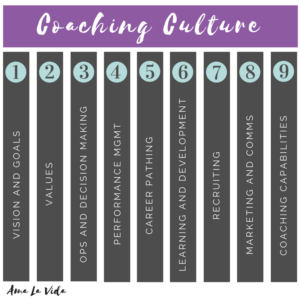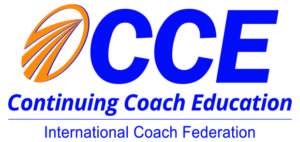Cultivate an Environment Where Employees are Motivated and Engaged
What is a Coaching Culture?
A coaching culture supports and empowers employees to learn and grow in a safe space which can yield a 130% increase in business performance and plays a key role in leadership development and employee retention. The clear linkage to business results coupled with an ever-growing desire among employees to be coached, not managed, makes an investment in your team’s coaching skills a mission-critical one. We assess an organization’s coaching culture across 9 key dimensions:

1. Vision and Goals: An organization with a strong coaching culture will have a clearly articulated company vision and business goals including people-forward goals. Goals cascade down to teams and individuals with clear understanding of how employees’ performance contributes to the organization. Employees feel like, “I’m part of these goals.”
2. Values: The organization will have defined cultural values and behaviors including values around employee empowerment. Values are continually reinforced by leadership and are embraced, recited and displayed by employees of all levels.
3. Operations and Decision Making: Employees are regularly engaged in two-sided conversations about goals and direction; processes are in place to incorporate employee feedback and ideas into company strategy. Values directly drive decision-making. Manager-employee conversations span tasks, goals, behaviors, emotions, motivators and vision.
4. Performance Management, Feedback and Recognition: In addition to a formal review process, on-the-spot performance discussions occur regularly. Managers and employees embrace feedback as the way we improve. Performance is recognized through both formal and informal measures and is often tailored to the specific individual being recognized.
5. Career Pathing and Planning: Career paths and expectations at each level are clearly defined. Numerous paths to success are possible and encouraged based on employee interests and skills. Frequent conversations take place with employees regarding their goals and how to take ownership of career path.
6. Learning and Development: The organization has a comprehensive onboarding including culture, business, technical and individual topics. Coaching is expected at milestones and available by request. Coaching techniques are embraced by all managers.
7. Recruiting: Leadership and coaching skills are evaluated with equal importance to technical capabilities for leadership positions. Top talent will be turned down if there is a misalignment in values or behavior.
8. Marketing and Communications: Employees are well aware of leadership development resources and regularly engage with them. Coaching and professional development are communicated as imperative, not a nice to have.
9. Coaching Capabilities: Few employees lack self-awareness and emotional intelligence; systematic efforts are in place to strengthen and address blind-spots. Leaders appropriately switch between manager/mentor/coach based on the situation and need. Coaching techniques and practices are integrated into the way business is done.
Click here to view our Coaching Culture Maturity Matrix to see how companies evolve from traditional management practices to adoption of leading coaching techniques. Want to know how your company stacks up across the 9 dimensions? Schedule a free strategy session with us, and we will provide you with your Coaching Culture Scorecard and provide you with recommendations for the future.
Train Your Team to Coach Like Pros
Ready to Take Action?
This program is a coach training model which includes online programming and virtual or in-person workshops. It concludes with a mock coaching session with a certified Ama La Vida coach to ensure your team walks away as skilled coaches and your organization understands the important role coaching plays in professional development.
![]()
UNDERSTANDING COACHING
Module 1: What is coaching culture?
Help your leaders understand what a coaching culture is and how utilizing coaching skills can help them become stronger managers and cultivate a higher-performing, more engaged workforce.
Module 2: What is coaching and what is not?
Coaching is not the same as mentorship, consulting or therapy. Learn the differences and when each approach is appropriate to maximize performance and professional growth.
Module 3: What do you need to be a coach?
Understand six key qualities you need to behave like a coach and have open and engaging coaching conversations.
Module 4: Coaching skill: Active listening
Sometimes we hear, but we don’t truly listen. Help your managers listen beneath the words to understand their team members’ key desires and concerns so that they can lead most effectively.
Module 5: Coaching skill: Deep questioning
Questions invite coachees to think differently, to reflect and to challenge their own assumptions and ways of thinking. Questioning is a leaders’ tool to help guide team members to arrive at their own insights and commit to them.
WORKSHOP #1
COACHING FRAMEWORK
Module 6: Coaching framework – ADIT Model
Assess. Discover. Implement. Transition. Following a framework is critical to ensure coaching addresses the true need, team members are held accountable to their goals and that changes stick.
Module 7: Structuring coaching sessions
Leaders learn how the ADIT model can be applied to long-term goal achievement or captured within a singular coaching conversation.
Module 8: Coaching skill: Effective feedback
Providing feedback is a critical component of talent development. Leaders learn how to deliver feedback that is meaningful, effective and respectful.
Module 9: Coaching skill: Appreciative Inquiry
Leaders learn to use questioning to guide team members toward solutions versus getting stuck analyzing the problem. This strengths-based approach engages and inspires the coachee.
WORKSHOP #2
COACHING THE INDIVIDUAL
Module 10: We’re all wired differently
No two team members are exactly alike, and so the leader will need to flex their style and approach to support development of different personalities and skill sets.
Module 11: Mental models and reframing
The stories we tell ourselves and our perceptions of the world shape how we show up at work. Leaders learn to dissect and rebuild those stories for more positive and constructive outcomes.
Module 12: Coaching skill: Understanding Mindsets
Fixed mindsets believe talent is static. Growth mindsets believe capabilities can be learned and strengthened over time. In this module, leaders learn how to help team members develop a growth mindset.
Module 13: Coaching skill: Understanding passions, gifts and values
In order to best motivate and engage the team, leaders must understand what each person is passionate about, gifted at and what they value in a professional environment. Pausing to understand these differences helps leaders appreciate the diverse talents of the team and strategize on how to best utilize the strengths of each team member.
WORKSHOP #3
OUR COACHING CULTURE PROGRAM IS ACCREDITED BY THE INTERNATIONAL COACH FEDERATION
